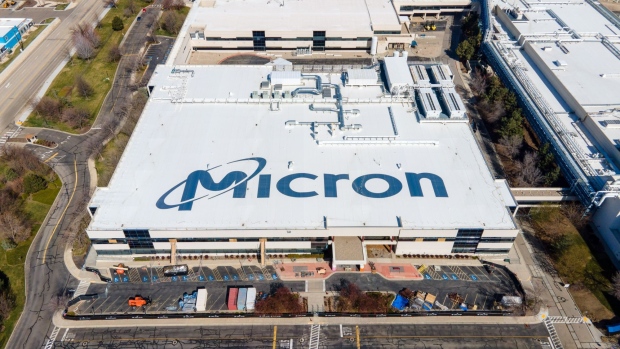Jun 30, 2022
Micron’s Dim Outlook Suggests Tech Spending Is on the Wane
, Bloomberg News

(Bloomberg) -- Micron Technology Inc., the largest US maker of memory chips, gave a weak forecast for the current period as consumers cut back on spending on computers and phones.
Sales will be about $7.2 billion in its fiscal fourth quarter, Micron said in a statement Thursday. That compares with an average analyst estimate of $9.14 billion, according to data compiled by Bloomberg. Excluding certain items, profit will be about $1.63 a share, the company said, well short of the $2.57 predicted by analysts.
The outlook reflects a slowdown for two key markets for Micron’s memory chips: computers and smartphones. Consumers and businesses have been reining in spending amid concern that the major world economies are headed for recession.
“Recently, the industry demand environment has weakened, and we are taking action to moderate our supply growth in fiscal 2023,” Chief Executive Officer Sanjay Mehrotra said in the statement. That means the company plans to use stockpiles to fill orders, rather than increasing its production, and will spend less on new plants and equipment.
Micron’s shares fell more than 8% in extended trading following the report, before recovering somewhat to a decline of about 3%. They had already lost 41% this year through the close, part of a rout for semiconductor stocks that had rallied over the last five years.
In the three months ended June 2, Micron’s revenue grew 16% to $8.64 billion, its smallest increase in more than a year. Net income was $2.63 billion, or $2.34 a share. Profit and sales were roughly in line with analysts’ predictions.
Micron’s memory chips perform a crucial role in electronic devices -- one that’s grown as the amount of data generated has accelerated. And Mehrotra has argued that more money will flow to its category of chips as that trend continues.
The US company competes with South Korea’s Samsung Electronics Co. and SK Hynix Inc., as well as Japan’s Kioxia Holdings Corp., in a market that has historically been perilous and unpredictable. Many of their products are sold as interchangeable commodities, which can suffer rapid price fluctuations -- sometimes trading for less than they cost to produce.
DRAM chips hold information temporarily, helping processors crunch data. Nand flash memory, meanwhile, acts as permanent storage in phones and computers. Micron, based in Boise, Idaho, is a smaller contender to Samsung in both types of chips, with the South Korean company dominating the industry.
(Updates with CEO’s comment in fourth paragraph.)
©2022 Bloomberg L.P.





